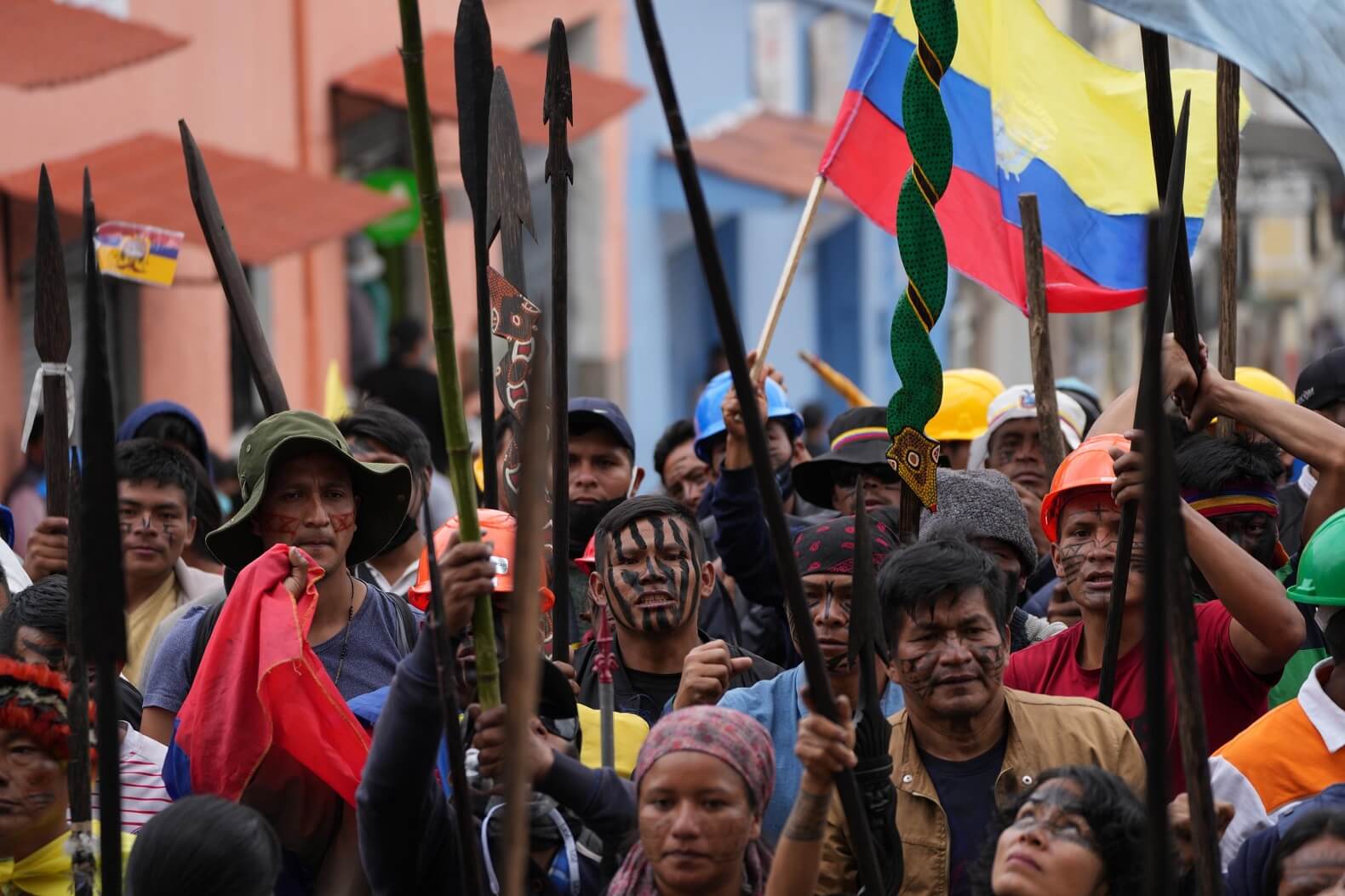After President Guillermo Lasso announced fuel price cuts and lifted the state of emergency in six provinces, leaders from Ecuador’s Confederation of Indigenous Nationalities (CONAIE) met with the government to reach an agreement after 14 consecutive days of protests. Demanding “a policy that can benefit the poor more,” CONAIE continued its push for its list of 10 demands, which include fuel price cuts, price controls on agricultural goods, greater government spending on education, and a limit on oil and mining projects.
In fact, CONAIE leader Leonidas Iza denounced the $0.10 fuel price reduction as “insufficient and insensitive,” adding that the indefinite strike shall continue so that “a dignified life is not a privilege of a few in Ecuador.” He claimed that the “Indigenous peoples have really been insulted” and condemned Lasso for a “lack of will” to find a way out of the economic crisis. Iza thus affirmed their “resistance” would continue.
#ParoNacionalEcuador
— CONAIE (@CONAIE_Ecuador) June 27, 2022
Ausente @LassoGuillermo se instala la reunión de la CONAIE, @confeniae1, ECUARUNARI, FEINE, FENOCIN con los poderes del Estado, el movimiento indígena sostendrá las decisiones colectivas para garantía de resultados para os 10 puntos.
Las bases en vigilia. pic.twitter.com/UXP1eQ9HKz
Indigenous groups are demanding a reduction in gasoline prices to $2.10 per gallon and diesel prices to $1.50 per gallon; they have thus deemed Lasso’s ten cent reductions of both gasoline and diesel prices to be “insufficient,” with Iza saying, “We see there is little will on the substantive issues.”
Lasso, meanwhile, has insisted that his government is open to dialogue but warned that “those who seek chaos, violence and terrorism will face the full force of the law.”
In recent days, the president has made multiple concessions. On June 25, he ended the state of emergency and reduced fuel prices the next day. He has also announced subsidised fertilisers, debt forgiveness, budget increases for health and education, and reduced cooking oil prices.
¡10 centavos no es poco! La reducción del costo del combustible representa un ahorro de casi un salario básico al año. Estas decisiones no solo honran el esfuerzo y compromiso de los pequeños productores y comerciantes, sino que les permitirán reactivar su economía. pic.twitter.com/Tan5VKbGoG
— Guillermo Lasso (@LassoGuillermo) June 27, 2022
Furthermore, his government has agreed to appoint a Commission to facilitate dialogue between the government and the protesters, in order to create “spaces for peace, in which Ecuadorians can gradually resume their activities.”
The president said these measures have been met with “more acts of violence and terrorism,” despite resolving all the demands of the Indigenous protesters. He thus said the armed forces and the police would continue to work towards re-establishing “order” and “peace.”
He further noted the price cuts and other concessions will result in $600 million in lost revenue, meaning that the government cannot reduce prices any further than it has already done.
In fact, the Ministry of Energy and Mines released a statement late on Sunday warning that continued protests by Indigenous groups could result in oil production being halted within two days due to “road closures and acts of vandalism.” It noted that the country has reached a “critical” point, as it has lost around $120 million in revenue since the protests began, with a 50% drop in oil production from 520,000 barrels per day.
📍[COMUNICADO OFICIAL]
— Ministerio de Energía y Minas Ecuador (@RecNaturalesEC) June 26, 2022
📍Informamos que en dos días se detendría la producción petrolera del país, como consecuencia de los cierres viales y los actos vandálicos en los pozos.
📌Más detalles en 🔽 pic.twitter.com/4FMVPRzlbp
To this end, Italo Cedeno, the manager of state-run oil company Petroecuador, has said curbing oil production amid a global surge in prices is akin to “a crime.”
Aside from the vulnerability of the oil industry, Lasso’s decision to roll out concessions may also have been motivated by a seemingly imminent impeachment motion against him.
Opposition party Union for Hope (UNES) coalition, with support from 47 signatories, holds Lasso responsible for the “serious political crisis and internal commotion” in the country since protests started on June 13.
He has been accused of deploying “excess and irrational use of force during the demonstrations” under the state of emergency, which has resulted in six deaths so far. His removal is scheduled to be debated in the National Assembly today and requires 92 out of 137 votes to be put forward.
Indigenous people constitute around one million of Ecuador’s 17.7 million inhabitants and are disproportionately affected by rising inflation, unemployment, and poverty, all of which have all been further exacerbated by the COVID-19 pandemic.
With a deal between Indigenous leaders and the Lasso government still out of sight, protests are likely to continue unabated. Demonstrations have thus far led to six deaths, 108 arrests, and 166 injuries. Simultaneously, road blockades in 19 provinces have caused food, fuel, and medicinal shortages.

